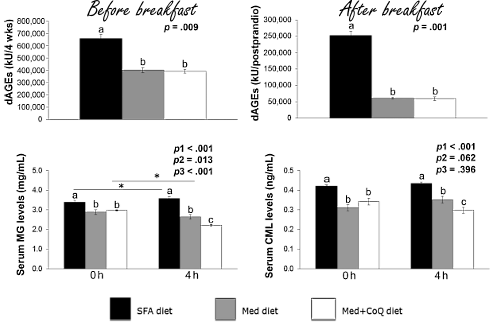 Forum für Lebensverlängerung
»
Ernährung und Nahrungsergänzung
»
Heilung, Prävention und Verjüngung durch Ernährung
»
Jungbrunnen Olivenöl
Forum für Lebensverlängerung
»
Ernährung und Nahrungsergänzung
»
Heilung, Prävention und Verjüngung durch Ernährung
»
Jungbrunnen Olivenöl


|
|
The anti-AGE-ing effect of olive oil Zitat |

|
|
Bei mir gibt es jeden Morgen einen Schluck Olivenöl mit einem Schuss frischgepressten Zitronen Saft. Müsste jetzt aber mal nachschauen ob es gut ist, es hat den Siegel und ist kaltgepresst. Sind die Öle aus dem DM gut? Vielleicht kann jemand von euch was dazu sagen.
scooter44 sagt danke
|

|
|
Hallo Leute, |

|
|
Naja, was ist denn nun die Quintessenz? Langer Rede kurzer Sinn: |

|
|
Zitat von Dr.Faust im Beitrag #29 Hi, das eine Öl zum Ende der Reportage heißt "Balduccio" Vorbestellen kannst Du es z.b. hier: https://www.kniepsmich.de/vorbestellung 2 weitere Öle (haben aber nichts mit der Reportage zu tun) direkt vom Erzeuger gibt es z.b. hier: http://www.bio-olivenoel.net/ https://alisseos.de/ Und hier das wäre auch interessant: https://www.oelea.de/gutes-olivenoel-kaufen#.Wx-MiuiFNhH
Dr.Faust sagt danke
|

|
|
Vor vielen Jahren wurde die Teekampagne gegründet, diverse Jahre später eine gleichartige Organisation für den Verkauf von Olivenölen. Wenn ich mich recht entsinne, ist es arteFakt, die bereits ihr 20-jähriges Jubiläum feiern.
Tizian sagt danke
|

|
Janola
(
gelöscht
)

|
Die gesundheitlichen Vorteile, die Olivenöl mit sich bringt, sind doch schon seit Jahrzehnten bekannt. |

|
|
Beim Einkauf von Olivenöl achte ich auf das Mindesthaltbarkeitsdatum, welches mindestens noch 1 Jahr haltbar sein sollte. Ich bevorzuge sortenreine Öle in dunklen Gasflaschen, keine Plastik oder Klarglasflaschen.
mithut sagt danke
|

|
|
|

|
|
|

|
|
Eine Empfehlung der Gesellschaft für menschliche Medizin (Promotion): |

|
|
Damit es noch besser schmeckt: Zitat |

|
jayjay
(
gelöscht
)

|
#38
Joker sagt danke
|

|
|
Zitat von Dr.Faust im Beitrag #38 Ich kaufe seit ca. 3 Jahren immer biologisch angebautes Koroneiki Olivenöl aus Griechenland. Soll einen der höchsten Polyphenolgehalte haben. Es schmeckt auch schön bitter und scharf, was auf reichlich sekundäre Pflanzenstoffe schließen lässt. https://polyphenole.info/2019/10/13/oliv...t-es-so-gesund/ |

|
|
|

|
|
Zitat von mithut im Beitrag #42 Du hast Recht, aber Olivenöl schmeckt für mich viel leckerer als Hanföl :-) |

|
|
Epigenetic Modifications Induced by Olive Oil and Its Phenolic Compounds: A Systematic Review |

|
|
Consumption of Olive Oil and Risk of Total and Cause-Specific Mortality Among U.S. Adults
La_Croix und Ununheilig haben sich bedankt!
|

|
|
Sehr schön! Ob allerdings die Ergebnisse ausschließlich durch die gesundheitlichen Vorteile von Olivenöl zu Stande kamen oder ob die Daten nur durch die gesundheitschädliche Wirkung anderer Fette so gut aussehen? Ist Olivenöl vielleicht auch nur ein Indiz für Menschen mit einem ganz allgemein gesundheitsorientierten Lebensstil? |

|
|
Zitat von Prometheus im Beitrag #47 Da wird sicher beides auch eine gewisse Rolle spielen, Vergleiche "hinken" ja meistens an irgendeiner Stelle. Aber man bedenke auch die von Dir geposteten positiven Eigenschaften allein von Olivenblättertee z. B. auf die Nierengesundheit. Ich pers. bin sicher, daß es Pflanzen und auch Bäume gibt, deren Blätter und Früchte und auch Produkte, die man aus beidem herstellen kann, generell gesundheitliche Benefits liefern. Das Olivenbäume dazugehören, die ja selbst eine enorme Überlebenskraft besitzen müssen, um in den heimischen Klimazonen zu überleben, unabhängig davon, daß sie schon tausende Jahre kultiviert werden, kann ich mir jedenfalls gut vorstellen.
Prometheus und Roger haben sich bedankt!
|

|
|
Neu, diesmal epidemiologische Daten aus Spanien. Höherer Olivenöl-Konsum = 50% verringerte „frailty“ bei ü60
Prometheus sagt danke
|

|
|
Die Fragen bleiben:
Prometheus, mithut, Tizian und Roger haben sich bedankt!
|

 Thema drucken
Thema drucken 06.04.2018 14:44
06.04.2018 14:44


 Antworten
Antworten
